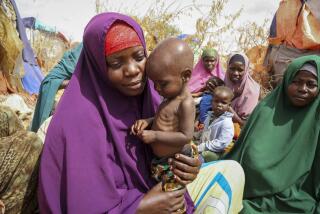Poverty is another war rolling through Iraq
- Share via
AMMAN, JORDAN — A third of Iraqis live in poverty, according to a study released under United Nations auspices Sunday, dire findings for a nation that enjoyed widespread prosperity less than three decades ago.
The report, produced by a division of the Iraqi government and the United Nations Development Program, examined access to, and the quality of, a wide range of basic needs.
It found that by 2004, Iraqi living standards had deteriorated considerably compared with that of the 1970s and ‘80s, particularly in the areas of water, electricity, sanitation, jobs, income and assets.
Damaged or dangerous housing conditions and educational access and quality were also found to be significant areas of deprivation.
A subtext to the report is how much the eroding conditions are contributing to Iraq’s civil war. Though the report made no official findings on the subject, a top U.N. official in Amman, the Jordanian capital, said that poverty offered “a very fertile ground to recruitment” for militant activity in Iraq.
“When you are jobless, when you don’t have electricity and water, you become more vulnerable to being recruited by extremist groups,” Paolo Lembo, director of the United Nations Development Program in Iraq, said in an interview. “My personal opinion is, yes, it is a contributing factor.”
The survey was based on data collected in 2004 as part of a survey of Iraqi living conditions conducted by the U.N. and Iraq’s Ministry of Planning and Development.
In addition to the one-third of Iraqis living in poverty, the study found that 5% of the population was living in extreme poverty.
Though the data are three years old and do not capture the deterioration in living standards since the 2003 U.S.-led invasion, human rights officials say the study is still useful because it is the first comprehensive look at poverty and deprivation in Iraq and because it creates a baseline for future studies.
Though living standards started to decline under the decades-long leadership of Saddam Hussein, and continued through two wars and crippling sanctions that followed, the report takes aim at economic policies put in place after the 2003 invasion.
The policies, which reflect American free-market priorities, dismantled state-run enterprises that employed hundreds of thousands of Iraqis and ended subsidies.
The policies presented Iraqis with wrenching change, leading to high unemployment and frustration, the report said.
The study found Iraq’s damaged infrastructure to be the largest factor in creating poor living conditions.
It said 85% of households lacked a stable source of electricity, with weekly and even daily outages. Nearly 70% of households struggled with getting rid of garbage, and more than 40% had inadequate sanitation facilities.
Deprivation levels also were seen as a factor in malnourishment.
Residents in the country’s mostly Shiite Muslim south were found to suffer the most, whereas people in Baghdad and northern Iraq had the highest living standards.
Poverty levels were three times higher in rural areas.
The report’s authors urged officials in charge of Iraq’s reconstruction to slow efforts to privatize the economy and improve ways to help people cope with the changes.
“It’s not a criticism to anyone; it’s a reality we must address,” Lembo said.
christian.berthelsen @latimes.com
More to Read
Sign up for Essential California
The most important California stories and recommendations in your inbox every morning.
You may occasionally receive promotional content from the Los Angeles Times.













